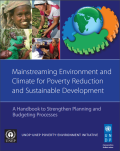
This Handbook is designed as guidance for policymakers and practitioners to mainstream pro-poor environment and climate concerns into planning, budgeting and monitoring. Mainstreaming is achieved by putting poverty-environment issues at the heart of government—in other words, by taking these issues into mainstream economic decision-making processes, particularly the national and subnational planning and budgeting processes led by ministries of finance, planning and local government,and supported by ministries of environment.
Over the last 10 years, the Poverty-Environment Initiative, a joint programme of the United Nations Development Programme and UN Environment, has successfully supported the integration and implementation of pro-poor, environmental sustainability objectives into national, subnational and sectoral development policies, plans and budgets to contribute to poverty alleviation and an inclusive, green economy. The Handbook provides guidance and concrete examples from PEI experience in Africa, Asia-Pacific, Europe and the Commonwealth of Independent States, and Latin America and the Caribbean, as well as from other initiatives.
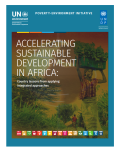
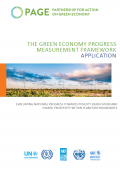
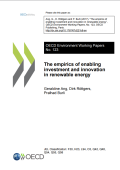
This working paper undertakes econometric analysis to assess the impacts of climate mitigation policies and the quality of the investment environment on investment and innovation in renewable power in OECD and G20 countries. It also assesses how countries’ investment environments interact with climate mitigation policies to influence investment and patent activity in renewable power. The paper gathered and tested data across OECD and G20 countries on more than 70 explanatory variables, which were analysed using two Poisson-family regression models: one to investigate determinants of investment flows in renewable power from 2000 until 2014; and one to investigate determinants of patent counts in renewable-power technologies from 2000 until 2012.
Results of the econometric analysis are consistent with the main hypothesis in this paper that beyond setting climate mitigation policies, policy makers need to strengthen the general investment environment and align it with climate mitigation policies in order to mobilise investment and innovation in renewable power across OECD and G20 countries.
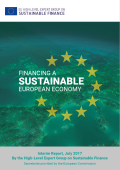
This interim report of the High-Level Expert Group on Sustainable Finance (HLEG) of the European Commission identifies two imperatives for Europe’s financial system. The first is to strengthen financial stability and asset pricing, by improving the assessment and management of long-term material risks and intangible factors of value creation. The second is to improve the contribution of the financial sector to sustainable and inclusive growth, notably by financing long-term needs such as innovation and infrastructure, and accelerating the shift to a low carbon and resource-efficient economy.
The report presents the initial analysis, options, dilemmas and trade-offs that the HLEG has identified and outlines key areas where European policymakers could further align financial practices with sustainable policy objectives.
